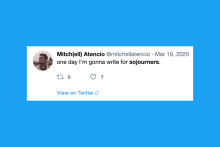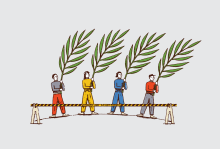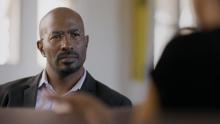social media

THE POLITICAL ENVIRONMENT in this country has caused great concern among many of us, Christian and otherwise. This month’s scripture passages spark various theological and socio-political hauntings that shed insight for us on how to respond.
For instance, we need to understand that God does not seek the destruction of creation to manifest God’s plan. No calamity can be justified as somehow being “God’s intention.” In addition, we need prophetic peace with all of God’s creation. This peace demands justice and reparations. I continue to pray for Palestine, Israel, and other nations where violence abounds. Third, we stand with all the queer people who are experiencing tremendous hardships because of intentional policy choices. Fourth, we will not be fooled by hate speeches that pretend to be freedom speeches. Words matter. We are responsible for what we say on any platform or in any capacity.
Our circumstances require us to respond, in whatever ways we can and on the issues that speak particularly to us. As we do so, even while we create room for self-critique, we are invited to be generous and patient with ourselves as we seek to navigate as wisely as possible these challenging times.

MAYBE YOU FIRST saw it while sitting in the waiting room of the doctor’s office — a Fox News banner update across the bottom of the screen. Or perhaps you saw the hashtag on X or Threads. Maybe you’re following the story as internet sleuths exchange theories on Reddit. Here’s what you know: There’s an SUV making its way from California to Washington, D.C., driven by a man and a woman in their 20s. They’re transporting some sort of nuclear device, and they plan to blow up the president. And, for some reason, law enforcement isn’t taking this very seriously.
It’s the story of the moment. Even though nobody has any real facts. Everyone just knows we’re collectively watching a disaster unfold.
Such is the setup for Jason Pargin’s I’m Starting to Worry About this Black Box of Doom, a parable of the dangers of the information age. Pargin’s witty, incisive novel illustrates how social media has eroded our ability to trust each other.

Like any other Gen Zer, I’ve grown up hearing about the potential harms of social media: As early as elementary school, teachers and parents warned us of stranger danger, not just in the grocery store, but also online. I was 12 when I got my first social media account on Instagram (even though my hand-me-down iPod Touch didn’t have a camera). In seventh grade, I, and many of my classmates, wrote our final essays for English class on the influence of social media on teenage girls’ body image. I was in junior high when news broke that Facebook user data had been improperly harvested to manipulate U.S. voters. In my high school’s speech and debate club, I learned about dangers of doxxing — posting people’s personal information, like addresses, online as a way to target them for violence. And in my own work here at Sojourners, I regularly see the hate and homophobia that shows up in social media comments.

My “For You” page is dancing again. Coming off the release of Beyoncé’s country album, Cowboy Carter, the TikTokers have taken center screen and are imitating line dances in celebration of her new sound. Sheepishly, I have been attempting to join in. I don’t dance. Or I should say I do not dance well. I’ve never been classically trained, I’ve got two left feet, and I still have to silently mutter the steps to the electric slide to stay on beat. I’ve consistently struggled to find my rhythm, but I dance anyway.

In October of last year, 33 states sued Meta, the parent company of Facebook, Instagram, and WhatsApp, alleging that the company has “concealed the ways in which these Platforms exploit and manipulate its most vulnerable consumers: teenagers and children.” The lawsuit further alleges that the company “repeatedly mislead the public about the substantial dangers of its Social Media Platforms.” The most recent lawsuits make it clear that churches, that are operating large numbers of social media accounts, must do some soul-searching about whether they should stay on platforms that are causing harm to young people.

HAVE YOU EVER had one of those perfect moments?
My wife and I sat on a bench at the farmers market with a plate of steaming hot tamales before us and a bag of crisp fennel bulbs, Pink Lady apples, and fresh spinach at our feet. The air smelled of salt and cooking oil. A deep yellow and iridescent gold light wrapped around us. Every noise fell away in a holy hush. We met, however fleeting, the “still point of the turning world” described by poet T.S. Eliot. Held and beheld.
To be honest, I usually miss these moments. Though I try (religiously) to keep custody of my mind and attention, the world we live in now beeps, dings, buzzes, and updates 24/7. It’s hard for God to break in. Perhaps this description of digital architecture’s pointed intrusions into our one beautiful life is too minimalist. Most days, I’m holding my breath against the crushing dynamics of digital onrush and knowledge outflow. I miss the still points between the crest and lip of that wave.

We must reject the idea that wealth has any bearing on a person’s true acumen, potential, or value. This is harder than we might think and takes some deliberate work. Frankly, it might be harder and more important to rethink our ideas around poverty, recognizing that a person’s lack of money doesn’t tell you anything about the value of who they are, what they’re capable of, or what they have to offer the world.

I WAS SITTING in a large auditorium full of market researchers. A speaker suggested that, by selling wrinkle cream, we were helping to make the world a better place because women would feel better about themselves. I looked around the room, thinking, “Is everyone buying into this? Do people really think this is true, or do they see that it’s just a corporate pep talk?”
I had worked in the world of international market research for nearly 10 years. Though there were a few moments like this one when something just didn’t feel right, in many ways I still didn’t see the issues I see so clearly now — marketing techniques are the air we breathe.
I eventually left my work in marketing to pursue a master’s in social justice and a doctorate in theological ethics. I began to investigate how marketing practices negatively impact how we live as human beings and how we think about marketing in the church. In contemporary society, we tend to view marketing techniques as neutral tools that can be applied in different contexts — whether for businesses, nonprofit fundraising, or church communication. But can we adapt tools that have been developed in the context of capitalistic profit maximization to the mission of the church? Are there fundamental differences in how the church views and relates to human beings?
I had worked in the world of international market research for nearly 10 years. Though there were a few moments like this one when something just didn’t feel right, in many ways I still didn’t see the issues I see so clearly now—marketing techniques are the air we breathe.

Twitter is a strange thing — if it’s any singular thing at all. If it does come to an end, I hope we’ll look back reflectively and carefully, learning from what we got right, what we got wrong, and growing into the future.

I WROTE MY first “Eyes and Ears” column in January 1987 when I was a Sojourners staff editor. Over the ensuing years, I’ve changed from Protestant to Catholic, from full-time journalist to full-time teacher, and from city mouse to country mouse. I’ve been married to Polly Duncan Collum and helped raise four children. Through all that, I’ve kept this column going, but now I’m pulling the plug to make way for whatever’s next.
In my first column, I set out a twofold purpose for this space. I intended to track the merger of politics and popular culture that began in earnest with the 1980 election of a movie star president. I noted then that our public life was largely being reduced to an “ephemeral community of shared media experience,” by which, at the time, I meant mostly Hollywood movies and various televised spectacles.
By the time we elected a reality TV star as president, the convergence of politics and popular culture was already long complete, except that, in a world of microtargeted messaging, there is no longer even much “shared media experience” from which to forge a community.
My second rationale for starting the column, however, has held up a little better. I noted way back then that, in both politics and popular culture and in the intellectual netherworld of think tanks and commentary journalism, the very definitions of terms such as “America,” “democracy,” and “Christianity” were up for grabs. In 1987, I called this a “war of ideas” and it continues with a vengeance, though often degenerating into an emotional war of identities.
However, “stuff happens.” And in these 35 years, two big things have happened that exploded many of my expectations and drastically altered the cultural landscape.

Although it is hard to imagine a world without Facebook, we must look critically at the implications of its widespread use and the powerful companies that control these platforms — and us. Whether by making election interference easier, selling people’s data, fostering social division by populating feeds with malice, greed, and dissension, social media provides an opportune venue for users to live into our depraved human condition. The consequences of this, however, are not contained in the digital world.

UNTIL RECENTLY, I had a boss who kept CNN on all day in her office. I work in communications, so this made sense, but it made me wonder: How can we best consume the news? Does the news make us anxious and divide us? Or does it serve as a way to learn about the world and how we can better love and serve our neighbors? Though the evidence is mixed (we rarely have simple answers in life), Jeffrey Bilbro’s verdict on news consumption in Reading the Times is mostly negative.
Bilbro’s analysis suggests that modern media—understood broadly to include everything from newspapers to social media—divides our attention among trivia, binds us to the daily rather than allowing attention to the eternal, and diverts us from local, embodied concerns to national ones outside our scope of influence. His argument ranges broadly, integrating thinkers from Thoreau and Auerbach to the more modern Wendell Berry and Charles Taylor. The reader feels like they are in a college classroom, in a good way, with a professor who isn’t afraid to synthesize broadly to make their point.

LIKE THE FRENCH police officer in Casablanca who was “shocked, shocked” to find gambling in Rick’s Cafe, in the wake of the Jan. 6 riot at the U.S. Capitol, social media companies were “shocked” to discover violent anti-Semitic and white nationalist agitators lurking in plain sight on their platforms. With their usual earnest hypocrisy, the companies took action, banning tens of thousands of groups and individuals from the social media universe. Facebook and YouTube suspended Donald Trump’s accounts. Twitter permanently banned him.
Never mind that in the preceding days and weeks those same social media platforms hosted the planning for Jan. 6, or that for years they have profited from a business model that ignores truth and promotes outrage. But when some of their more unruly customers got off the leash and started threatening the people who write antitrust laws, Facebook, Google, and Twitter suddenly became tribunes of civility.
Of course, such monumental hypocrisy from Big Tech gave many Republican politicians the opportunity to change the subject from their own possible complicity in the insurrection to what they claim is suppression of free speech by the liberals in Silicon Valley. To this, clever liberals have replied that the First Amendment only applies to government, not to private corporations.

IF ASKED “What era would you time travel to if you could?” many young Black and brown and Indigenous people would answer in a flash, “None of them.” Why? We’re too aware of the past and what it means for us today—we tweet about the results of American slavery and can break news of the latest injustice to emerge from centuries-long hatred of nonwhite skin faster than MSNBC. We feel the negative effects of history enough each day to not want to go back there.
But maybe we should. If all we see of ourselves on TV and social media is us sick, oppressed, or dead, what other understanding of ourselves do we miss? How can we remember that we are greater than the damage done—that our history holds more than that and so might our present?
Ruby Sales, founder and director of the SpiritHouse Project, helps young people invested in faith and social justice see themselves through the lens of their divine wealth and boundless potential rather than through eyes dimmed by media and versions of history shaped by white supremacy. Sales, who by age 17 was a Student Nonviolent Coordination Committee member registering people to vote in her home state of Alabama, has a Master of Divinity degree from the Episcopal Divinity School and is a preacher, speaker, and intergenerational mentor on racial, economic, and social justice. I spoke with her in December by phone. —Da’Shawn Mosley
Da’Shawn Mosley: I watched a YouTube video of you speaking in 2015 at St. Albans Episcopal Church in D.C. and was struck by what you said about today’s youth: that the most recent generations have incredible insight but haven’t lived enough to have hindsight.
Ruby Sales: Now that I’m working with young folks in my fellowship program and have had some time to weigh how things have changed from the ’90s to the 2000s, I think young people lack insight also. When you have been raised in a technological age, when history is no longer lived experience but is created on social media and reproduced through technology, I think that long-term memory is affected, as well as the ability to empathize and connect with human suffering. There is a difference between being able to theorize about human suffering and being able to feel it. All of these are challenges faced by generations raised in a technocracy—the decimation of history, of who we are as a people.

THE PAST DECADE has seen an endless trickle of negative stories about social media—data breaches, Russian bots, cyberbullying, digital radicalization, etc.—so by now almost everyone knows that the amusement and convenience those platforms offer come with a downside. But now a new Netflix documentary, The Social Dilemma, is here to tell us one big thing: It’s worse than we thought. In fact, it’s worse than we could have possibly imagined.
In the film this alarm is raised by many of the very people who helped create the systems they now decry. We’re talking about the guy who invented the “Like” button for Facebook, the guy who designed the recommendation engine for YouTube, the fellow who invented the infinite scroll. One after another these mostly white, mostly male characters come on camera to tell us how badly their proudest accomplishments have gone awry.
The big problem these folks warn us about is that our smartphones constantly collect data (what we buy, what music we play, where we are, who we talk to, etc., ad nauseam) and that data is used to fuel a system of targeted alerts, notifications, and recommendations designed to keep us on a site for as long as possible and deliver us to advertisers who also have that data about us.

IN LESS THAN two weeks in late 2019, three heads of government (in Iraq, Lebanon, and Bolivia) agreed to step down under pressure from mass protests. Earlier last year, long-standing military dictators in Sudan and Algeria were forced from power following popular uprisings.
On their own, these events are remarkable. What makes them truly extraordinary is that they came amid a worldwide protest wave from Hong Kong to Manipur to Chile that has toppled governments, led to new social policies, and challenged basic economic structures.
Authoritarian regimes are not protesters’ only targets. In Chile, considered an oasis of stability in South America, protests triggered by a hike in subway fares have grown into popular demands for an end to corruption and economic inequality. And the global climate movement has used walkouts, sit-ins, and civil disobedience to dramatize the need for urgent action. In each case, popular dissatisfaction with traditional institutional approaches has encouraged a turn to extra-institutional (and at times extra-legal) resistance.
Surprisingly, this proliferation of people-power movements has taken place amid a period of declining effectiveness for movements. While around 70 percent of major nonviolent movements in the 1990s succeeded, only around 30 percent did so from 2010 to 2017. Protests have been easier to start but more difficult to resolve. So, have the movements of 2019 broken these trends?
We link the declining rates of effectiveness and their potential reversal to the emergence of parallel global networks of protesters and repressive governments (both dictatorships and democracies), who use increasing access to global information to rapidly learn from one another. This means that ideas, symbols, and tactics that both help movements succeed and successfully suppress them spread quickly from their origins to other struggles. In the past, waves of successful protests often lasted years. What we are seeing now—and are likely to see more of in the future—are short, sharp waves of successful protests followed by short waves of failures.

His latest docuseries, CNN’s The Redemption Project, Van Jones a look at what restorative justice and healing looking like within our criminal system, bringing offenders face to face with those affected by their violent crimes in hopes of promoting dialogue and healing.

THIS YEAR MARKS the 50th anniversary of the invention of the internet. One day in October 1969, scientists successfully transmitted data from a campus computer at UCLA to a computer at Stanford. Twenty years later, the infrastructure for the World Wide Web went into operation, and the creation of our whole digital universe quickly followed.
Lately, there have been plenty of days that have convinced me that the invention of the internet is one of the worst things that has happened since our first human parents decided that a little bit of “knowledge of good and evil” couldn’t possibly hurt anything.

We hope that the suffering we’ve seen on our social media feeds will provide consensus. We convince ourselves that this moment, this tragedy, this picture of suffering will provide the common denominator that will spark people’s compassion. How can anyone look at the picture of a child running from tear gas and not feel compassion? By calling to mind these images in our sermons, we hope to open people up to hearing about different political solutions to the problem at hand. If anything, we’ll all agree that we must do something.
